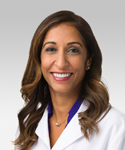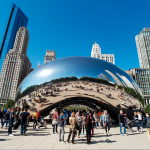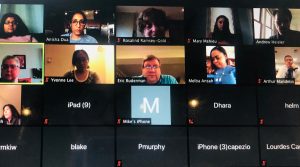
Regular online meetings help Anisha Dua, MD, MPH, connect with fellows, physician extenders and nurses to troubleshoot challenges in response to COVID-19.
Unable to connect with rheumatology fellows and patients in person, Anisha Dua, MD, MPH, and a team of rheumatologists have worked quickly to find new ways to communicate and share resources. Dr. Dua directs rheumatology medical education and the fellowship training program at Northwestern Memorial Hospital (NMH), Chicago. She spoke with The Rheumatologist about how the pandemic is affecting her and her practice.
Q: How is your teaching being affected by COVID-19?
This is a question of significant importance to me. Although many meetings and lectures have become virtual, we no longer have residents or students rotating on rheumatology. Our fellows’ clinics are being carried out remotely through conference calls with the fellow, attending and patient. Of course, we are limited in our ability to execute diagnostic workups for our patients or use our physical exams to aid in the assessment of our patients.
I co-direct the musculoskeletal module for first-year medical students, and this [class] was quickly transitioned to live-streamed videos. The technology learning curve has been steep, and we are trying to maintain our mission to our trainees to educate them amid this chaos.
In response to such technological challenges, one of my fellows, Sarah Fantus, brought up the idea of combining forces and working with other programs to deliver didactic lectures in rheumatology. I reached out to the Chicago area programs and a few program directors at other institutions to gauge interest in trying to pool resources and expertise to teach our fellows. This [idea] picked up considerable momentum, and within a week, the Virtual Rheumatology Learning (ViRL) collaborative officially launched on April 7. This dedication to education and demonstration of leadership nationally is awe inspiring and exemplifies the collaborative community I am honored to be a part of.
Q: How are you and your staff adapting to the sudden changes brought about by the pandemic?
This [time] has been quite a test of our ability to adapt and mobilize. As a rheumatology community here at Northwestern, we are doing a great job working together efficiently to ensure the safety of our patients, our staff, our colleagues and ourselves. Since the pandemic started, many significant changes have occurred to our workflow and the way we deliver care.
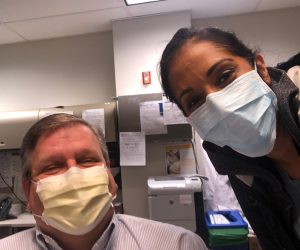
Dr. Dua (right) with colleague Eric Ruderman, MD, (left) are taking turns working rotations in their clinic to limit staff.
We are doing everything possible to maintain continued delivery of patient care, while promoting social distancing and safety. We have converted outpatient rheumatology visits—both for returning and new patients—to virtual encounters done from home. We have two nurses, one front desk staff member and one physician on-site at clinic to help manage infusions, triage any patients who may show up at clinic and also help move along paperwork, such as prior authorizations and disability paperwork.
Patients continue to come into our infusion center for their medications, but we have decreased the number of chairs at any given time to allow for distance between patients, and we have reduced all non-critical infusions. There is a delay on any non-urgent imaging studies, and most of our consult service is being done outside of patient rooms. We have biweekly online meetings that involve all of the faculty, fellows, physician extenders and nurses to discuss the COVID-19 crisis and troubleshoot any concerns or issues people are facing.
Q: What are patients’ chief concerns regarding COVID-19’s potential risks and symptoms?
This is a time of heightened anxiety for everyone, including our patients. By definition, the majority of our patient population is immunosuppressed at baseline, and they have very significant concerns and fears surrounding the COVID-19 pandemic. They want to know if they are at higher risk of infection and whether it is safe to leave their homes to go for lab testing, pick up medications or buy groceries.
Many patients are asking whether they should decrease or stop any of their immunosuppressive therapies or how their medications may affect their risk of getting or fighting COVID-19. Others have very real concerns about whether they will have trouble accessing medications they have been on chronically for their underlying disease, especially in light of the frenzy surrounding the use of hydroxychloroquine.
We are trying to provide reassurance and ensure access to medications, while encouraging social distancing and aggressive hand hygiene. There is also a group of students at NMH helping deliver groceries and medications to patients who are debilitated and have transportation issues.
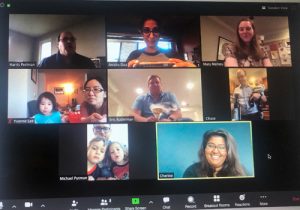
Virtual happy hour gives Dr. Dua and colleagues an opportunity to stay connected after the work day.
Q: How is the pandemic affecting you and your staff personally?
There are very real fears and anxiety and the usual outlets—such as social interaction and exercise—are now severely limited. Personally, it’s hard to sleep, hard to focus and hard to figure out what even to focus on. There is a very real tension between wanting to be ready and prepared to help wherever needed on general medicine/COVID-19 services against the background of questioning how equipped I am to do this well. There is a thirst and drive to try and learn as much as possible about this disease to gain insight and understanding, but there is an overwhelming amount of information and a complete lack of information, all at the same time.
This [situation] is disorienting and troublesome for myself and many others. I have found myself using things I never considered before, such as the Headspace app to meditate, online yoga and virtual happy hours—such foreign concepts—are becoming quickly commonplace.
I know many of my colleagues and trainees are trying to balance care for their children or elderly parents along with continuing to perform their work from home and be available to volunteer and help when needed. Staff are not needed in clinics at the regular volume, so many are not working, working from home, if possible, or have been re-directed to other services.
Medical students and residents have been pulled off of any elective rotations, and many are staying at home so they are available as other healthcare providers get sick, quarantined or the volume requires the dispatching of more hands on deck. This is all along the backdrop of nagging questions about how long this will last, what the post-COVID-19 world will look like, and whether there will be enough PPE, ventilators and dialysis machines to care for those who need it.
Although this all sounds pretty bleak, there truly are areas of growth and hope that are sprouting against this backdrop. The amount of volunteerism, altruism, support, innovation and willingness to dive in and do whatever is needed is truly awe inspiring. I have never been prouder to be a physician because I’m surrounded by so many resourceful, intelligent, passionate and dedicated people.
Carina Stanton is a freelance science journalist based in Denver.
